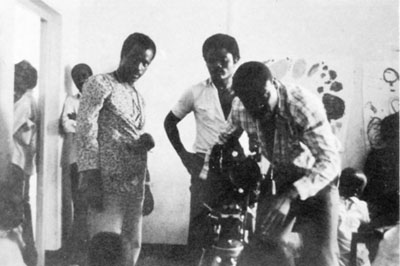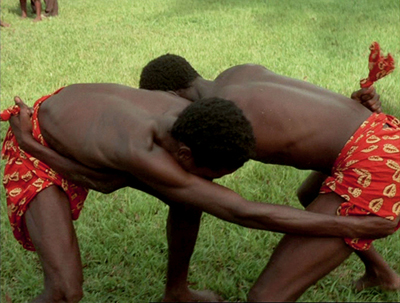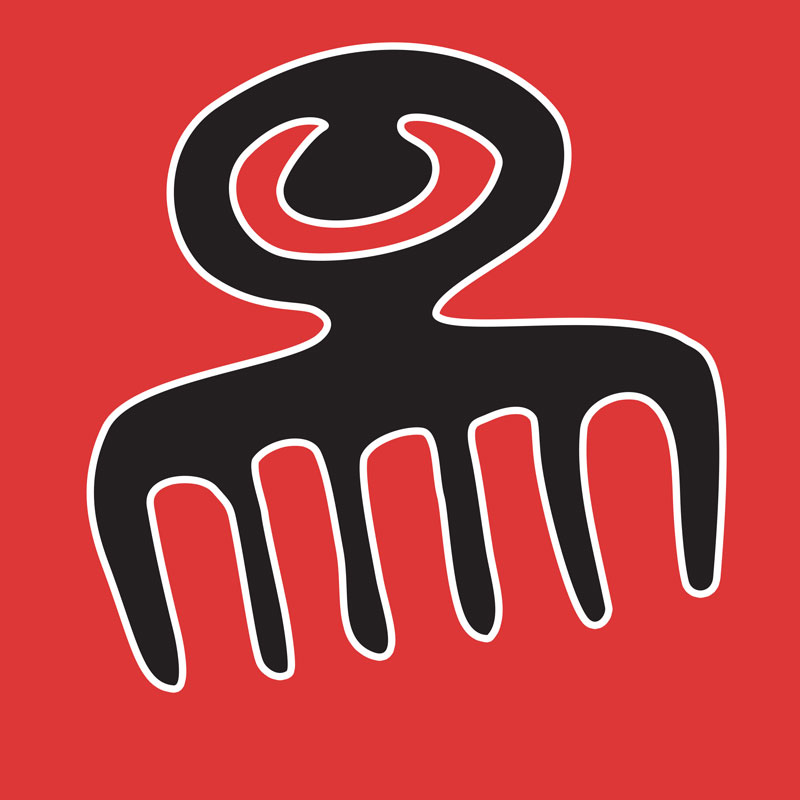Fiche Personne
Cinéma/TV
 © DR
© DR
Jean-Michel Tchissoukou
Réalisateur/trice, Scénariste
République du Congo
 © DR
© DR
Français
Réalisateur congolais (Congo Brazza).
Jean-Michel TCHISSSOUKOU est un cinéaste congolais.
Né le 12/05/1942 (à Point-Noire, Congo), il est mort en 1997 à Brazzaville (Congo).
Formé à l’INA et l’OCORA, il est l’un des premiers cinéastes congolais après l’indépendance.
Jean Michel Tchissoukou devient co-animateur de la station de Télévision Congolaise à son démarrage en 1963. Après l’admission au concours de l’OCORA en France, il revient à la station de Télévision Congolaise en 1966 et participe à l’animation de l’antenne comme opérateur de prises de vues, ensuite comme chef-opérateur, chef de production et enfin directeur des programmes. Il effectue ensuite des stages à l’Institut National de l’Audio-visuel comme directeur de la photographie. Jean-Michel Tchissoukou a réalisé plusieurs émissions tant en direct que sur films pour la Télévision et a participé au tournage de quelques films congolais. Entre autres réalisations, citons « Les Illusions » (1971), court-métrage en noir et blanc axé sur l’exode rural des jeunes vers les villes, « L’Enfant et la Famille » (1979), court-métrage en couleur de 40 minutes produit par l’UNICEF et le Comité National pour l’Année Internationale de l’Enfant. « La Chapelle » (1980) est son premier long-métrage en couleur. En octobre 1979, Jean-Michel Tchissoukou devient directeur de la Production cinématographique à l’Office national du Cinéma. Il réalise un second long-métrage, « M’Pongo – Les Lutteurs », en 1982.
FILMOGRAPHIE :
/// 1970 | ILLUSIONS, moyen métrage
avec Kodia Nkouka
/// 1978 | L’ENFANT ET LA FAMILLE, documentaire
/// 1979 | LA CHAPELLE
avec Alphonso Hernalsteen De Olivera, Segolo Dia Manungu, Albert M’Bou, Gaston Samba
/// 1982 | LES LUTTEURS (M’Pongo | The Wrestlers)
avec Beranger Dubois, Albertine Ngalou, Joseph Nzigou Kengue
Fuente / Fontes / Our Source / Quelle / Nos Sources (MAIS INFORMAÇÕES / READ MORE / PLUS D’INFOS) :
– Africiné Magazine
– www.3continents.com/en/individu/11549/
– https://trigon-film.org/en/directors/jean-michel-tchissoukou/
– https://en.wikipedia.org/wiki/Jean-Michel_Tchissoukou
– https://cinephilazr.fr/fiche_TCHISSOUKOU_JeanMichel.htm
Updated by Thierno DIA, 06 March 2025
Jean-Michel TCHISSSOUKOU est un cinéaste congolais.
Né le 12/05/1942 (à Point-Noire, Congo), il est mort en 1997 à Brazzaville (Congo).
Formé à l’INA et l’OCORA, il est l’un des premiers cinéastes congolais après l’indépendance.
Jean Michel Tchissoukou devient co-animateur de la station de Télévision Congolaise à son démarrage en 1963. Après l’admission au concours de l’OCORA en France, il revient à la station de Télévision Congolaise en 1966 et participe à l’animation de l’antenne comme opérateur de prises de vues, ensuite comme chef-opérateur, chef de production et enfin directeur des programmes. Il effectue ensuite des stages à l’Institut National de l’Audio-visuel comme directeur de la photographie. Jean-Michel Tchissoukou a réalisé plusieurs émissions tant en direct que sur films pour la Télévision et a participé au tournage de quelques films congolais. Entre autres réalisations, citons « Les Illusions » (1971), court-métrage en noir et blanc axé sur l’exode rural des jeunes vers les villes, « L’Enfant et la Famille » (1979), court-métrage en couleur de 40 minutes produit par l’UNICEF et le Comité National pour l’Année Internationale de l’Enfant. « La Chapelle » (1980) est son premier long-métrage en couleur. En octobre 1979, Jean-Michel Tchissoukou devient directeur de la Production cinématographique à l’Office national du Cinéma. Il réalise un second long-métrage, « M’Pongo – Les Lutteurs », en 1982.
FILMOGRAPHIE :
/// 1970 | ILLUSIONS, moyen métrage
avec Kodia Nkouka
/// 1978 | L’ENFANT ET LA FAMILLE, documentaire
/// 1979 | LA CHAPELLE
avec Alphonso Hernalsteen De Olivera, Segolo Dia Manungu, Albert M’Bou, Gaston Samba
/// 1982 | LES LUTTEURS (M’Pongo | The Wrestlers)
avec Beranger Dubois, Albertine Ngalou, Joseph Nzigou Kengue
Fuente / Fontes / Our Source / Quelle / Nos Sources (MAIS INFORMAÇÕES / READ MORE / PLUS D’INFOS) :
– Africiné Magazine
– www.3continents.com/en/individu/11549/
– https://trigon-film.org/en/directors/jean-michel-tchissoukou/
– https://en.wikipedia.org/wiki/Jean-Michel_Tchissoukou
– https://cinephilazr.fr/fiche_TCHISSOUKOU_JeanMichel.htm
Updated by Thierno DIA, 06 March 2025
English
Congolese film director.
Jean-Michel TCHISSSOUKOU (1942-1997).
He was born in Pointe Noire in 1942. He studied cinema at the Institut National de l’Audiovisel (INA) and at the Office de Coopération radiophonique (OCORA) in Paris. Then, and during ten years, he worked for the national television channel in Congo. His skills in photography and film shooting lead him to directing his first short film called Illusions, which describes the exodus of young people from the fields to the main cities in Congo.
He worked as an assistant during the shooting of « Sambizanga » (1972) from the director Sarah Maldoror, a film that was immediately considered as a masterpiece of African cinema.
His first feature film called « La Chapelle » in 1979 won an award at the Fespaco festival in 1981. The film depicts the tensions between traditionnal african religions and the catholic church in the colonial 1930’s. His second feature film M’Pongo /Les Lutteurs, from 1982, is a mix of fiction and documentary where the Congolese culture and identity are analyzed.
This highly respected director died in 1997 in Brazzaville.
Fuente / Fontes / Our Source / Quelle / Nos Sources (MAIS INFORMAÇÕES / READ MORE / PLUS D’INFOS) :
– Africiné Magazine
– www.marfilmes.com/en/africafilms/the+wrestlers.htm
– www.3continents.com/en/individu/11549/
Updated by Thierno DIA, 06 March 2025
_____________
PT
Jean-Michel Tchissoukou (1942-1997)
Este cineasta congolês nasceu em Ponta Negra em 1942. Estudou cinema no Instituto Nacional do Audiovisual (INA) e na Agência de Cooperação Radiofónica (OCORA) em Paris. Durante 10 anos, trabalhou para o canal de televisão nacional do Congo.
As suas aptidões para fotografia e cinema levou à realização da sua primeira curta-metragem chamada Illusions, que descreve o êxodo dos jovens do campo para as principais cidades no Congo.
Trabalhou como assistente durante as filmagens de Sambizanga (1972) da realizadora Sarah Maldoror, um filme que foi imediatamente considerado uma obra-prima do cinema Africano.
A sua primeira longa-metragem, La Chapelle, 1979, ganhou um prémio no festival Fespaco em 1981. O filme aborda as tensões religiosas no período colonial de 1930 entre a religião tradicional africana e a da Igreja Católica. A sua segunda longa-metragem foi M’Pongo / Les Lutteurs, 1982, é uma mistura de ficção e documentário, onde a cultura e a identidade congoleses são analisadas.
Este realizador muitíssimo respeitado morreu em 1997 em Brazzaville.
Source:
www.marfilmes.com/pt/africafilms/m+039+pongo.htm
Jean-Michel TCHISSSOUKOU (1942-1997).
He was born in Pointe Noire in 1942. He studied cinema at the Institut National de l’Audiovisel (INA) and at the Office de Coopération radiophonique (OCORA) in Paris. Then, and during ten years, he worked for the national television channel in Congo. His skills in photography and film shooting lead him to directing his first short film called Illusions, which describes the exodus of young people from the fields to the main cities in Congo.
He worked as an assistant during the shooting of « Sambizanga » (1972) from the director Sarah Maldoror, a film that was immediately considered as a masterpiece of African cinema.
His first feature film called « La Chapelle » in 1979 won an award at the Fespaco festival in 1981. The film depicts the tensions between traditionnal african religions and the catholic church in the colonial 1930’s. His second feature film M’Pongo /Les Lutteurs, from 1982, is a mix of fiction and documentary where the Congolese culture and identity are analyzed.
This highly respected director died in 1997 in Brazzaville.
Fuente / Fontes / Our Source / Quelle / Nos Sources (MAIS INFORMAÇÕES / READ MORE / PLUS D’INFOS) :
– Africiné Magazine
– www.marfilmes.com/en/africafilms/the+wrestlers.htm
– www.3continents.com/en/individu/11549/
Updated by Thierno DIA, 06 March 2025
_____________
PT
Jean-Michel Tchissoukou (1942-1997)
Este cineasta congolês nasceu em Ponta Negra em 1942. Estudou cinema no Instituto Nacional do Audiovisual (INA) e na Agência de Cooperação Radiofónica (OCORA) em Paris. Durante 10 anos, trabalhou para o canal de televisão nacional do Congo.
As suas aptidões para fotografia e cinema levou à realização da sua primeira curta-metragem chamada Illusions, que descreve o êxodo dos jovens do campo para as principais cidades no Congo.
Trabalhou como assistente durante as filmagens de Sambizanga (1972) da realizadora Sarah Maldoror, um filme que foi imediatamente considerado uma obra-prima do cinema Africano.
A sua primeira longa-metragem, La Chapelle, 1979, ganhou um prémio no festival Fespaco em 1981. O filme aborda as tensões religiosas no período colonial de 1930 entre a religião tradicional africana e a da Igreja Católica. A sua segunda longa-metragem foi M’Pongo / Les Lutteurs, 1982, é uma mistura de ficção e documentário, onde a cultura e a identidade congoleses são analisadas.
Este realizador muitíssimo respeitado morreu em 1997 em Brazzaville.
Source:
www.marfilmes.com/pt/africafilms/m+039+pongo.htm
Films(s)
-
 Lutteurs (Les) | M’PongoLong-métrage – 1982Restaurée du négatif original Synopsis Pendant les années1930 a 1960 il y a eu un conflit de civilisations au Congo, comme un peu partout en Afrique Le réalisateur a adapté ce conflit en le situant dans le milie…Jean-Michel Tchissoukou est lié(e) à ce film en tant que réalisateur/trice
Lutteurs (Les) | M’PongoLong-métrage – 1982Restaurée du négatif original Synopsis Pendant les années1930 a 1960 il y a eu un conflit de civilisations au Congo, comme un peu partout en Afrique Le réalisateur a adapté ce conflit en le situant dans le milie…Jean-Michel Tchissoukou est lié(e) à ce film en tant que réalisateur/trice -
 Chapelle (La)Long-métrage – 1980Le Christianisme a joué, depuis longtemps en Afrique, un rôle important. Il s’est souvent aussi heurté aux religions traditionnelles. Nous sommes dans les années 30. Dans un village à 30 km du chef-lieu de la région n…Jean-Michel Tchissoukou est lié(e) à ce film en tant que réalisateur/trice
Chapelle (La)Long-métrage – 1980Le Christianisme a joué, depuis longtemps en Afrique, un rôle important. Il s’est souvent aussi heurté aux religions traditionnelles. Nous sommes dans les années 30. Dans un village à 30 km du chef-lieu de la région n…Jean-Michel Tchissoukou est lié(e) à ce film en tant que réalisateur/trice -
 Enfant et la famille (L’)Court-métrage – 1979Film de TCHISSOUKOU, Jean-MichelJean-Michel Tchissoukou est lié(e) à ce film en tant que réalisateur/trice
Enfant et la famille (L’)Court-métrage – 1979Film de TCHISSOUKOU, Jean-MichelJean-Michel Tchissoukou est lié(e) à ce film en tant que réalisateur/trice -
 Illusions [réal: J.-M. Tchissoukou]Moyen-métrage – 1970Un jeune paysan désoeuvré s’imagine que Brazzaville, où son frère aîné a trouvé un emploi, lui sera favorable. Son frère le reçoit froidement. Obtenir un emploi est difficile. Un groupe de maquisards l’entraîne dans une …Jean-Michel Tchissoukou est lié(e) à ce film en tant que réalisateur/trice
Illusions [réal: J.-M. Tchissoukou]Moyen-métrage – 1970Un jeune paysan désoeuvré s’imagine que Brazzaville, où son frère aîné a trouvé un emploi, lui sera favorable. Son frère le reçoit froidement. Obtenir un emploi est difficile. Un groupe de maquisards l’entraîne dans une …Jean-Michel Tchissoukou est lié(e) à ce film en tant que réalisateur/trice
Partager :



